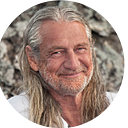Mark Whitwell | Mark Whitwell on The Three Requirements of a Yoga Teacher: Yoga Standards
Heart of Yoga | Mark Whitwell

The world needs its Yoga teachers.
The world needs sincere people in local community who are willing to be there for others and relate beyond the imaginary limitations of the social mind.
The world needs people who can share the tools of the tantra so that each person is empowered to embrace the natural beauty of their life within the One reality in which everything is arising.
My goal is to have an actual Yoga teacher in every city and every village in the world. We do not need more social patterning. We do not need more physical or spiritual gymnastics that put us on a hopeful trip towards some future result, state, or identity as a perfect person.
We need intimacy with the given reality that’s all.
What is Yoga?
Every person is already the perfection, the beauty, the power, and the harmony of life itself. Everything in the natural world is utterly beautiful. And you are of the natural world. There is nothing to attain. Yoga is merely your participation in the natural state.
We are now moving beyond the gymnastic bravado, bullying, and abuse that was legitimized by the young men who popularized Yoga in the west. The public is fed up or just think it is silly: “Stretching for girls.”
The young men like BKS Iyengar did a great effort to bring Yoga into the public mind. But they left out the principles that their guru Tirumalai Krishnamacharya (1888–1989) actually taught: the principles that make Yoga actually Yoga — your direct embrace of the nurturing force of reality itself.
The five basic principles of practice are:
1) The body movement is the breath movement.
2) The inhale is from above as receptivity; the exhale is from below as strength.
3) The breath envelops the movement.
4) Asana creates bandha; and bandha cannot be practiced outside of the context of asana.
5) Asana, pranayama, meditation, and life are a seamless process.
The Three Qualifications to Teach
Now that we have established ‘What is Yoga?’ we can address how to share it. There are only three qualifications to teach Yoga. None of which involves spending vast sums of money on international teacher trainings, accumulating abstract knowledge, or becoming some kind of perfect person without difficulties who is abiding as infinity itself 24/7.
The three qualifications to teach are:
1) You have a good teacher
You know what it is to be in relationship with an actual teacher — someone who is no more than a friend, and no less; who is willing to hold you to the fire of your life. Having been loved by another, you know what it is to love.
2) You practice yourself
You know what it is to participate in the unitary movement of body, breath, and mind on a daily basis in a non-obsessive, natural and actual way. You know what it is to enjoy the column of breath, above to below; to abide in the natural state of strength that is utterly receptive; and to rest in and as the nurturing source of life.
From the authority of your direct experience, you are able to communicate precisely to others how to do that. If you are not practicing, you have nothing to teach.
3) You care about others
The Yoga teacher is the force of Mother Nature’s nurturing in local community.
I had one teacher who said,
“You cannot teach someone anything unless you love them.”
And I know that you do care about others.

When Should I Teach?
I remember visiting my teacher TKV Desikachar in Chennai in the 1990s. I had brought a group of students of mine over from Auckland, Aotearoa/New Zealand to do a week of classes with him. During the week, one of my students asked him,
“When should someone start teaching?”
To which Desikachar immediately replied,
“When you are asked to.”
If you meet the requirements outlined above, then you must teach. If you have been graced with the rare gift of receiving actual Yoga, then you have no choice than to do your best to pass it on to as many people as possible in your lifetime.
Humanity is in a dreadful state. It is like walking through a desert full of thirsty people holding a supply of water. What are you going to do?
If you feel fear, know that it will improve your teaching because it shows humility. Let that emotion be there and still go out and teach.
And as my mother would say to me,
“Don’t let anything hold you back.”
*For more support in your practice and teaching you are invited to join our monthly community calls with sincere friends from around the world. Visit www.heartofyoga.com.
Author’s Bio:

Mark Whitwell has taught yoga for over three decades across the globe, and is the founder of the Heart of Yoga foundation, and the Heart of Yoga Peace Project. Mark Whitwell is interested in developing an authentic yoga practice for the individual, based on the teachings of T. Krishnamacharya (1888–1989) and his son TKV Desikachar (1938–2016), with whom he enjoyed a relationship for more than twenty years. Mark Whitwell is the author of four books: ‘Yoga of Heart,’ ‘The Promise,’ ‘The Hridayasutra,’ and, ‘God and Sex: now we get both.’ He also edited and contributed to his TKV Desikachar’s classic yoga text, ‘The Heart of Yoga.’ Mark Whitwell is a father of three and a grandfather. He now resides between New Zealand and Fiji and continues to write, teach, and speak.
Read More:
